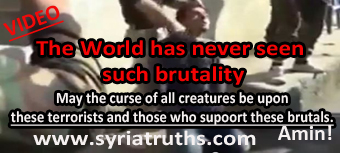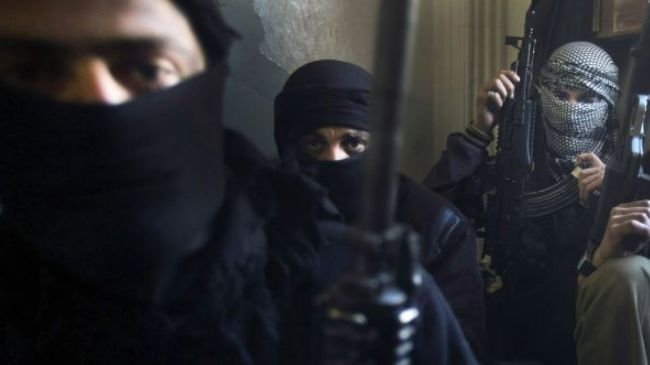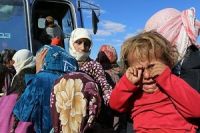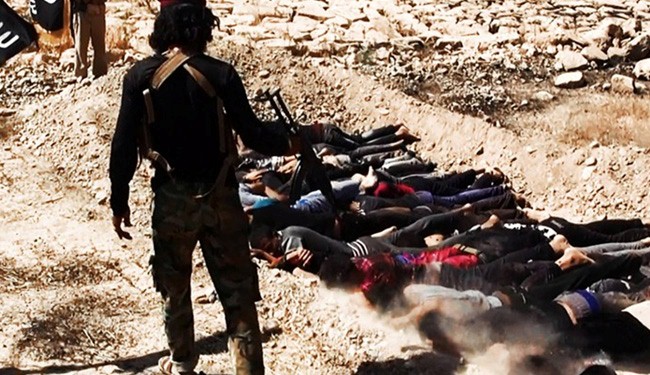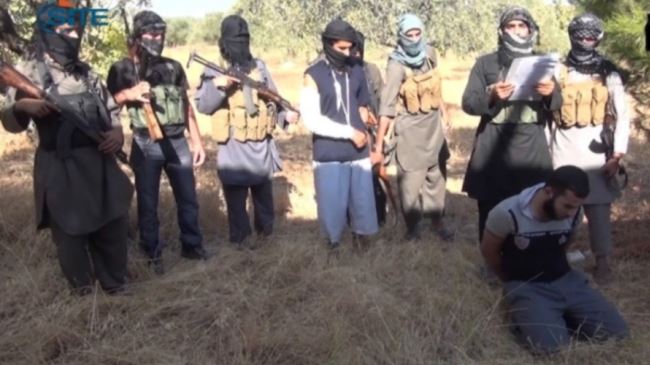Bustan al-Qasr crossing in Aleppo: Daily humiliation and nonsensical rules
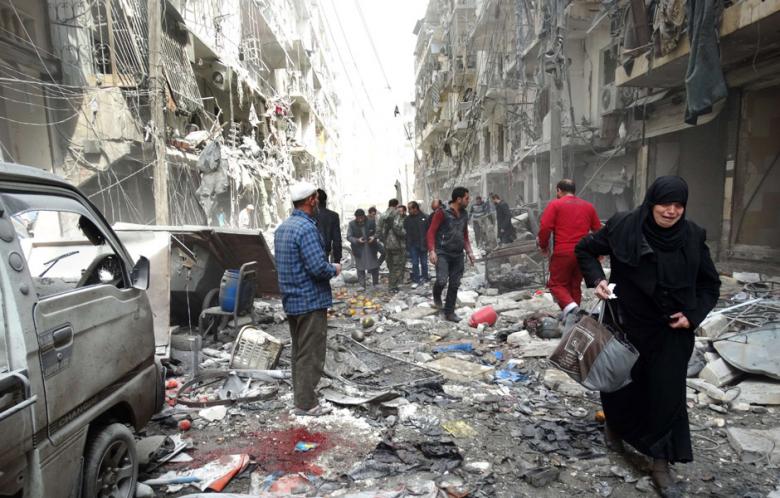
 Three harsh years have passed in Aleppo but the sight of people gathered in swarms at the crossing has been a painful image deeply etched in the hearts of the weary in the city. March comes for the fourth time to Aleppo since the outbreak of the Syrian revolution and still no sign of spring.
Three harsh years have passed in Aleppo but the sight of people gathered in swarms at the crossing has been a painful image deeply etched in the hearts of the weary in the city. March comes for the fourth time to Aleppo since the outbreak of the Syrian revolution and still no sign of spring.
Aleppo: “The passage of food, fuel, medicines, oil, diapers, milk, dairy products, vegetables, meats and bread is strictly forbidden…” This announcement was not hung at a border crossing by a socialist government trying to protect local products by prohibiting exports. Rather it was hung at a “fabricated” crossing between two sides of the same city by an Islamist group to prevent the passage of these goods on the eve of Ramadan 2012 to the other side of the city which it had not managed to “liberate” yet.
Between Ramadan 2011 and Ramadan 2013, life in Aleppo had completely changed. In the first year, the “people’s revolution” raging in Hama, Homs and other areas and the bloodshed it caused, did not manage to ignite one real protest in Aleppo which felt apprehensive about the word “revolution.”
In the second year, the revolutionaries came to the city to starve it after looting its markets and the property of its residents whom the revolutionaries accused of “barbecuing while the regime was killing its people.” As if the nutritional siege that the “liberators” imposed on the “liberated” was an attempt to make this claim about Aleppans’ preoccupation with barbecuing meat during spring picnics a real one.
Two buses were placed on top of each other at the entrance of the Bustan al-Qasr neighborhood in August 2012, leaving two sidewalks open for the people to swarm in order to pass through. This image gained notoriety and it has become a recurring image at Bustan al-Qasr crossing which links the neighborhoods occupied by fighters from the city to eastern neighborhoods that are still under government control. People are forced to gather amidst the fighting and the bullets as some of them fall drenched in their own blood.
People however have revolted more than once against the crossing’s leader who yells out “God is great,” as though it is a magic charm for confiscating people’s property and belongings. The people rush bare chested to cross, chanting “with our souls, with our blood, we will redeem you Bashar,” and “the Free Syrian Army are thieves, we want the regular army,” just to spite the crossing’s leader.
Before the Syrian army lifted the siege off the city’s neighborhoods, developments at the crossing became the main factor in determining the prices of goods in the neighborhoods of western Aleppo. Closing it for one day raises prices by a 100 percent, while closing it for several days might cause goods to disappear off shelves.
The Syrian army would sometimes close the crossing too, not only to goods, but to people as well. That would last for only a few days and for no clear reason.
Bustan al-Qasr crossing had a twin to the north called Bustan al-Ruz crossing. The role of this crossing ended when the militants seized control of al-Sheikh Maksoud neighborhood as a crossing point between the two sides of the city. Both crossings became famous after blocking the streets between the two sides at Bab al-Nasr, Maysaloun, Bustan al-Basha and all the roads leading to the countryside including al-Mansoura and Damascus roads.
The humiliation
The militants have multiple ways of humiliating Aleppans. Every person carrying a food item that is seized “infiltrating” to the western side of the city, where two million people live, is insulted and accused of smuggling it to the army, even if he swears that he is taking it to feed his family.
Faced with illogical edicts by the new leaders of the faithful, Aleppans came up with amusing ploys to smuggle food that will remain in our collective memory for a long time. The TV’s wooden frame became a refrigerator containing several bags of bread, meat, oil and children’s milk. A teenager’s pockets fit two chicken thighs, a breast and two wings. A boy was caught red handed by Islamist militants but they reassured him that they will not kill him for smuggling food to Assad’s soldiers.
Perhaps the most humiliating incident happened when a man, inspired by the suicide belt, wore a belt of four pounds of shish kebab meat around his belly. When the militants caught him, they punished him by spreading meat all over his naked body under the July sun with the temperature exceeding 104 ºF. He was covered with flies while the militants boasted of their deed, taking pictures of him with their cellphones and broadcasting them through their satellite equipment as they insisted that they caught a person smuggling food to the army.
Humiliation – from being forced to raise their hands, walk like war prisoners, undergo humiliating searches and throw food away – was not the only adversary facing Aleppans. Sniper bullets and stray bullets in confrontations between the militants and the army killed tens of people whose blood mixed with their “smuggled” goods such as vegetables, fruits and other foodstuffs.
Corpses of the dead and the murdered are transported between the two sides of the city on vegetable carts. The crossing has become Aleppo’s trademark, summing up to a large extent the record of their suffering and becoming a symbol of their humiliation and the violation of their city.
The leader of the crossing
The crossing has had a number of leaders who succeeded in controlling it and amassed huge fortunes. The least fortunate among them was Zakaria al-Atik, known as Abu Ghayyath. He was in his 40s when a sniper bullet from the Syrian army killed him.
The leader of the crossing assumes the role of the customs, justice and health departments, all the security branches, and that of issuing decrees and whatever else God wills. Certificates of origin and licences for passing issued by the Sharia Authority, stationed at the children’s hospital, must be checked at his headquarters after shakedown money is paid in an amount that is “pleasing to God” of course, based on the rates determined for each item.
The crossing, however, lost its economic value after opening up the Khanaser road, which connects the Aleppan neighborhoods that have not been occupied by the militants to the Damascus center. The crossing came to be used primarily for the passage of people, manufactured goods and raw materials. But the greed of the militants came up with an alternative to the shakedown money imposed on goods and commodities by charging money for the passage of people, each person charged Syrian pounds (SP) 3 thousand for each crossing.
The Islamic State in Iraq and Syria in Aleppo
As the Islamic State in Iraq and Syria (ISIS) expanded its presence in Aleppo, it sought to seize control of the crossing, taking advantage of the public anger against the militants’ practices and people’s hatred for them. Exercising control over the crossing serves two purposes: a material and a moral one, The material objective is the most important one as the crossing generates astronomical sums of money for the Shariah Authority and its factions. But the Sharia Authority and its fighters were not happy with ISIS’s attempted take over. ISIS’s control over the crossing means that it would have become the number one force in the area occupied in the city and would come in direct contract with Syrians living under the regime.
In October 2013, as different rural and urban areas were falling into the hands of ISIS, the most famous of the looters, Ahmed Afash, leader of the Free Syria Brigade, washed his hands of the crossing. He withdrew his battalions from the region, expressing his willingness to cooperate with any judicial party to “hold abusers accountable.”
ISIS was not able to seize control of the crossing. The Sharia Authority improved its treatment of people and held some of the offenders accountable. But its control of the crossing at the end of last year led to a hike in the amount charged for passing. It became 2,525 SP which means about US$ 16 after it had been 25 SP only, i.e., less than a quarter of a dollar.
The crossing today
As the army’s operations escalated in the past two months, waves of human beings, estimated at tens of thousands, passed through the crossing. Bustan al-Qasr crossing was shut down again forcing brothers, neighbors and families to cross a distance between 200 – 450 kilometers (124 – 279 miles) to move between neighborhoods. There isn’t a person in Aleppo who does not have a brother or a sister in the neighborhoods on the other side of the city.
This forced partition has had psychological repercussions. Residents of western neighborhoods feel betrayed and unappreciated because they had welcomed refugees from other neighborhoods and provided them with everything they need. In return they were faced with a siege, bombings, and protests demanding closing the crossing because residents of the eastern neighborhoods are not responsible for the luxury of the areas controlled by the regime.
That is how this bizarre revolution has accumulated artificially induced tensions in people’s hearts. As the war drags on into its fourth year, everyone knows that the crossing is… transient.
